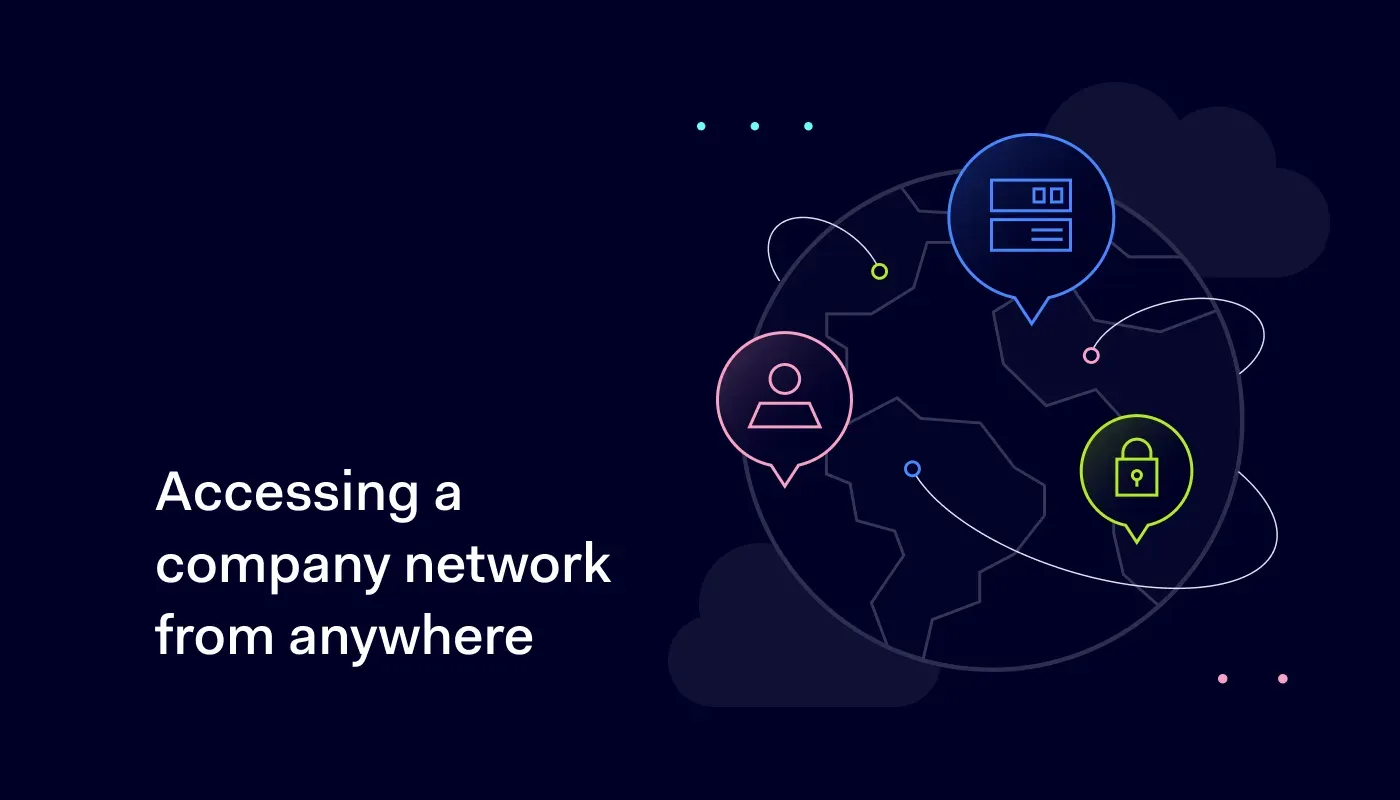Secure and easy access to workplace networks isn’t just a perk in the remote work era. Yet, remote work brings security and connectivity challenges businesses can’t ignore. We’ve all have come across the term Virtual Private Networks or VPNs in our work, whether we’re technology professionals, IT administrators, or just everyday remote employees.
In this article, we’ll break down the A-Z of VPNs. From secure access to a company's network from different locations to understanding why free VPNs might cost you more than you think. Plus, we’ll explore why business VPN might be one of your best business decisions.
What is a VPN?
A simple yet profound technology
Understanding what a Virtual Private Network (VPN) is the first step in learning how to access and share data on many branches of a company network from different locations.
A VPN creates a secure tunnel between your device and the internet, using advanced encryption algorithms to safeguard data in transit. This tunnel acts as a secure conduit through which data such as usernames, passwords, and sensitive files are sent and received.
This encrypted tunnel ensures that even if someone could intercept your data, they would not be able to decode it.
The secondary but equally important aspect of VPNs is masking your IP address. Every time you connect to the internet, your device is assigned an IP address, a unique identifier that can reveal your location.
Related Articles

Andrius BuinovskisAug 30, 20248 min read

Joanna KrysińskaNov 28, 20259 min read
A VPN replaces your IP address with one from its server, shielding your true location. This dual functionality of encryption and new IP address masking makes VPN both straightforward and robust. And it helps companies protect their privacy, data, and assets.
Role of VPNs in internet safety and remote work
VPNs: the gatekeepers of internet safety
VPNs create a digital barrier that protects your data from cyber threats like ransomware attacks, phishing scams, and data breaches. Given the alarming rise in cybercrime, their role in preventing business disruption and financial loss is crucial.
VPNs standardize technology processes for organizations spread across many locations, even internationally.
Businesses can use VPNs to securely share data and connect various locations to different network nodes, such as branch offices, cloud-based services, or mobile employees.
This standardization ensures uniform security across the entire organization, reducing vulnerabilities that cybercriminals could exploit.
Remote access facilitating offsite connection in business
Before, secure remote work was difficult due to complex security protocols and the limitations of traditional WANs. VPNs have dramatically simplified this process by offering secure, seamless remote access to a company's internal network from anywhere in the world.
With a VPN, remote employees can securely access many company resources, like files, applications, on-site servers, and internal communications tools.
For most businesses operating under a remote or hybrid work model, ensuring security for the secure remote worker makes a VPN indispensable. It ensures that employees can work as efficiently from home—or any global location—as they could if they were present at the office. To further enhance security and ensure continuous, uninterrupted access to network resources, implementing an Always On VPN can be needed.
3 risks of free VPN services: why quality matters
1. Compromised speed and limited server choices
The appeal of free VPN services often hinges on the absence of initial costs. Yet, these services frequently limit the internet speed available to users. These speed caps can significantly hamper productivity and efficiency for many businesses that need fast and uninterrupted access to data and communication tools.
Moreover, free VPN services usually offer a restricted range of server locations. This limitation can be problematic for businesses that need to connect to servers in specific geographic locations for compliance or operational reasons. The lack of server choices may also lead to network congestion, further slowing your connection.
2. Security risks: lax encryption and data logging
One of the most critical drawbacks of free VPN services is their inadequate security features. Many free VPNs lack state-of-the-art encryption protocols, leaving your data vulnerable to interception and unauthorized access. This compromised security is a severe issue, especially for businesses handling sensitive or confidential information.
Some free VPN services may log your browsing activities, a practice that contradicts the purpose of using a VPN for enhanced privacy.
These logs can be susceptible to data breaches or be sold to third parties for marketing purposes, putting your data and privacy at risk.
3. Suitability for businesses: high stakes, higher risks
Regarding business applications, relying on a free VPN can be a grave mistake.
The risks include slower internet speeds or fewer server choices. More seriously, they can extend to more consequential matters like compromised data integrity and potential breaches of customer information.
Businesses face greater risks in a cyber-incident, such as financial losses and damage to their reputation and customer trust. Given their many limitations, free VPN services aren’t appropriate for corporate use, where data security and privacy stakes are significantly higher.
Keep calm and work from home
Rely on NordLayer VPN to safely access your company network no matter where you are
Elevating enterprise security with a business VPN
Ensuring business infrastructure security
If you are serious about business data security, an enterprise VPN is the way to go.
These VPNs provide tailor-made solutions for businesses, unlocking capabilities such as IP allowlisting for secure resource access and offering more robust encryption protocols. This enables businesses to securely access company networks from various locations.
This technology setup ensures the security of your central server, and the software safeguards cloud computing services, on-site servers, remote offices, local area networks, and even individual computers at various business locations.
Distance entry: the future of work
The COVID-19 pandemic showed us that remote work is not just a trend—it's here to stay. A corporate VPN is essential for companies that have embraced this shift.
With this software setup, employees can securely access company networks from home and seamlessly share and receive data with colleagues globally.
The glue keeps your dispersed team on the same page: secure file sharing, one office environment, and one network.
Enabling remote access: bridging on-site servers with cloud services
Businesses nowadays are not just confined to physical office spaces or two offices—they also operate in virtual private networks in the cloud. So, how do you access the company network from different office locations, and can you bridge these two worlds? And what about static IP addresses?
Remote access VPNs are essential for cloud computing, requiring static IP addresses to establish connections to on-site servers and other cloud resources. These addresses aren’t just for enhanced security, they’re fundamental for any remote connection to a physical network or device. By following these prerequisites, users can significantly minimize risks associated with remote access, allowing employees to work securely, no matter where they are.
Boosting your business security with a VPN
The importance of wireless connection safety
While convenient, public Wi-Fi networks are a breeding ground for various cybersecurity threats. There are numerous vulnerabilities, from Man-in-the-Middle (MITM) attacks to cybercriminals eavesdropping on your data to unauthorized access.
These are not just fears—they’re real threats. They can translate into concrete security breaches involving sensitive personal or business data. This has been particularly underscored by the increasing cyber-attack incidents targeting users on public Wi-Fi networks.
Beyond the basics: advanced VPN features for enhanced online protection
Beyond the essential security features, corporate VPNs offer additional layers of protection. Advanced features like:
Split tunneling
Zero-knowledge architecture
Multi-hop connections
What does all of this mean for businesses? More options for keeping your internet connection safe, secure, and tailored to your needs. The saying goes, "The best defense is a good offense."
Conclusion: why a business VPN is an essential digital protection tool
Remote work demands robust security beyond standard business applications and software. Just as NordLayer’s VPN sets the bar high for a secure connection for remote work, your choice of a business VPN should meet similar standards. It's not just about better secure connections in remote offices, it's also about comprehensive data protection, user management, and ease of use, all while enabling all ways of working.
Don't settle for basic security features. Elevate your business operations with NordLayer's Business VPN solution. Move today to ensure a secure, virtual private network and efficient remote office work environment tailored to your needs.
Contact us today, and let us help you create a security solution that fits your business needs.

Agnė Srėbaliūtė
Senior Creative Copywriter
Agne is a writer with over 15 years of experience in PR, SEO, and creative writing. With a love for playing with words and meanings, she crafts content that’s clear and distinctive. Agne balances her passion for language and tech with hiking adventures in nature—a space that recharges her.













